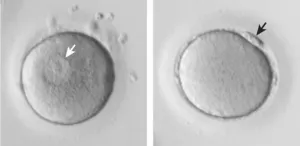Ageing impairs critical final egg maturation stage
Women's fertility may decline with age due to impaired RNA levels
2021-04-28
(Press-News.org) Age may adversely affect women's fertility by impairing levels of RNA molecules which in turn alter the function of genes involved in key biological pathways during the final maturation stage of a human egg cell, according to the findings of a new study published today in the journal Aging Cell.
Researchers from the Centre for Genomic Regulation (CRG), the Centro Nacional de Análisis Genómico (CNAG-CRG) and Clínica Eugin sequenced the RNA molecules, also known as the transcriptome, within oocytes to understand which genes are affected in their activity by age. They used single-cell sequencing to analyse the transcriptome of 72 individual oocytes from 37 donors between 18 and 43 years of age.
They found that the number of transcripts for genes involved in chromosome segregation and RNA processing increased progressively with age, while the number of transcripts related to mitochondrial metabolism decreased.
However, these age-related changes to the transcriptome only occurred when egg cells reached their final stage of development during in vitro maturation. The transcriptome was less affected by age in immature egg cells. According to the researchers, the findings suggest that age may influence an oocyte's ability to process gene products critical for the last steps of their development.
Further analyses revealed a number of potential master regulator genes, which are genes that occupy the very top of a regulatory hierarchy, that are affected by age. Future work will test whether these genes play a critical role in oocyte aging.
"Here we show that the final step of oocyte maturation itself might be negatively affected by age, which is critical for reproduction because it provides the material early embryos need to develop normally and survive," says Bernhard Payer, AXA Professor of Risk prediction in age-related diseases and Group Leader at the Centre for Genomic Regulation (CRG) and co-author of the study. "What we don't know yet, is which of these changes are merely a consequence of the aging process and which may directly contribute to the quality drop in oocytes with age."
The researchers also used donor height and weight information to assess the impact of body mass index (BMI) on the transcriptome. Unlike age, abnormal BMI mostly affected the transcriptome of immature oocytes. According to the authors, the finding suggests that the fertility decline caused by age might have different root mechanisms than the one caused by abnormal BMI.
Women's fertility generally declines with age. One of the main reasons for this is due to depleted ovarian reserves, as baby girls are born with all the oocytes, from which mature eggs will develop, during their lifetime. Another reason is that the quality of eggs lowers with age, which is thought to be one of the main reasons for higher rates of infertility after the age of 35. Being overweight or underweight has also been associated with poor oocyte quality and reproductive outcome.
The authors conclude that though more studies are required, their findings may result in the future development of new diagnostic tools to better assess oocyte quality in reproductive medicine, as well as potential drug treatments that modulate the affected pathways to rejuvenate aged oocytes.
INFORMATION:
The study is a collaboration between three different research groups based in Barcelona; Dr. Bernhard Payer's lab at the CRG, which is is the beneficiary of the AXA Research Fund support, Dr. Rita Vassena's lab at Clinica Eugin and the Single-Cell Genomics team of Dr. Holger Heyn at the Centro Nacional de Análisis Genómico (CNAG-CRG).
[Attachments] See images for this press release:

ELSE PRESS RELEASES FROM THIS DATE:
2021-04-28
BUFFALO, N.Y. -- A national, University at Buffalo-led study on genes in pediatric cardiomyopathy demonstrates strong evidence for routine genetic screening in children with the disease. The study, published April 28 in the Journal of the American Heart Association, revealed wide variation in screening, with some centers conducting routine genetic testing and others conducting none.
Conducted at 14 centers, the National Institutes of Health-funded study of 152 children with cardiomyopathy found that only half had undergone genetic screening. Of those who hadn't undergone screening, 21% were found to have a genetic cause for the ...
2021-04-28
Under normal, healthy circulatory conditions, the von Willebrand Factor (vWF) keeps to itself. The large and mysterious glycoprotein moves through the blood, balled up tightly, its reaction sites unexposed. But when significant bleeding occurs, it springs into action, initiating the clotting process.
When it works properly, vWF helps stop bleeding and saves lives. However, according to the Centers for Disease Control and Prevention (CDC), about 60,000 to 100,000 Americans die each year from thrombosis, a disorder characterized by too much clotting. Blood clots can trigger a stroke or heart attack.
According ...
2021-04-28
Today at the Microbiology Society's Annual Conference, Yang Liu, researcher at Hong Kong Polytechnic University, will discuss a new technique to trap and recover microplastics.
The method uses bacterial biofilms, a sticky substance created by micro-organisms, to trap microplastic particles. The biofilm is then processed and dispersed, releasing the microplastic particles for processing and recycling.
Liu and colleagues used the bacterium Pseudomonas aeruginosa to capture microplastics in a bioreactor. This species of bacteria is found in all environments and has previously been shown to colonise microplastics in the environment.
P. aeruginosa biofilms ...
2021-04-28
Research shows that children who experience puberty earlier than their peers are more likely to begin drinking alcohol at a young age and early alcohol exposure is also known to be related to alcohol dependence later in life. Specifically, adolescents who mature early are two to three times more likely to drink than other youth. In addition, early maturing girls are two to three times more likely to drink until intoxication and three times as likely to have an alcohol use disorder. A new study examined why early developing 14-year-old adolescents are more likely to drink alcohol compared to those whose pubertal development is on-time or late. The findings show these adolescents are more likely to have ...
2021-04-28
Frequent use of exemptions may undermine public health protections of oil and gas setback policies, according to a new study led by researchers at the research institute PSE Healthy Energy, Harvard University, and Nicholas Institute for Environmental Solutions at Duke University. The study, published April 28, 2021 in Energy Policy, is the first to assess the effectiveness of distance-based setback regulations for unconventional natural gas development (UNGD) or "fracking."
"Setback regulations are commonly employed to protect public health, so we wanted to test if they're effective in practice," said lead author Drew Michanowicz, DrPH, ...
2021-04-28
In a new nationwide poll, the GeneSight® Mental Health Monitor found that 83% of people with depression agree that life would be easier if others could understand their depression. Yet, most people who have not experienced depression may not be able to understand the challenges, including its treatment.
"Depression is one of the most misunderstood disorders. When people misinterpret patients with depression as 'lazy' or 'dramatic,' they are vastly underestimating and misunderstanding the debilitating symptoms of major depressive disorder," said Mark Pollack, M.D., chief medical officer for the GeneSight test at Myriad ...
2021-04-28
UNIVERSITY PARK, Pa. -- Parents of teens who went through puberty early may be more lenient when it comes to letting them consume alcohol, according to a new Penn State study. But the researchers said that even if adolescents appear more mature, drinking alcohol is still not safe for them.
Rebecca Bucci, a PhD candidate in criminology at Penn State, said the study -- published today (April 28) in Child Development -- aimed to discover why adolescents who go through puberty early are more likely than their peers to drink alcohol.
"A surprising proportion of parents in our study allowed their early-developing children to drink alcohol at the age of 14 -- in fact, ...
2021-04-28
CLEVELAND, Ohio (April 28, 2021)--Hot flashes are a hallmark of the menopause transition. Yet, they don't strike with the same frequency or severity for all women. A new study suggests that some of the same genetic factors that affect a woman's reproductive life cycle may also help predict her likelihood of having bothersome hot flashes. Study results are published online today in Menopause, the journal of The North American Menopause Society (NAMS).
Despite multiple studies on the subject, questions still remain as to why some women are more affected than others by hot flashes and night sweats during the menopause transition. Genetics may be one reason, ...
2021-04-28
Whether you hanker for a hard hit of caffeine or favour the frothiness of a milky cappuccino, your regular coffee order could be telling you more about your cardio health than you think.
In a world first study of 390,435 people, University of South Australia researchers found causal genetic evidence that cardio health - as reflected in blood pressure and heart rate - influences coffee consumption.
Conducted in partnership with the SAHMRI, the team found that people with high blood pressure, angina, and arrythmia were more likely to drink less coffee, decaffeinated coffee or avoid coffee altogether compared to those without such symptoms, and that this was based on genetics.
Lead researcher ...
2021-04-28
CHARGE syndrome is a rare genetic disorder affecting about 1 in 10,000 newborns. It can lead to neurological and behavioural disorders for which no treatment is currently available. Dr. Kessen Patten and his team, from the Institut national de la recherche scientifique (INRS) have just discovered a compound that could alleviate these symptoms. The results of their research were published in the journal EMBO Reports.
Understanding Neurological Disorders
First described in 1979, CHARGE syndrome is caused by mutations in the CHD7 gene and is associated with neurodevelopmental disorders such as intellectual disability, attention deficit disorder with or without hyperactivity, seizures and autism spectrum disorder. Dr. Patten's research team studied the ...
LAST 30 PRESS RELEASES:
[Press-News.org] Ageing impairs critical final egg maturation stage
Women's fertility may decline with age due to impaired RNA levels


